 Petzlover
Petzlover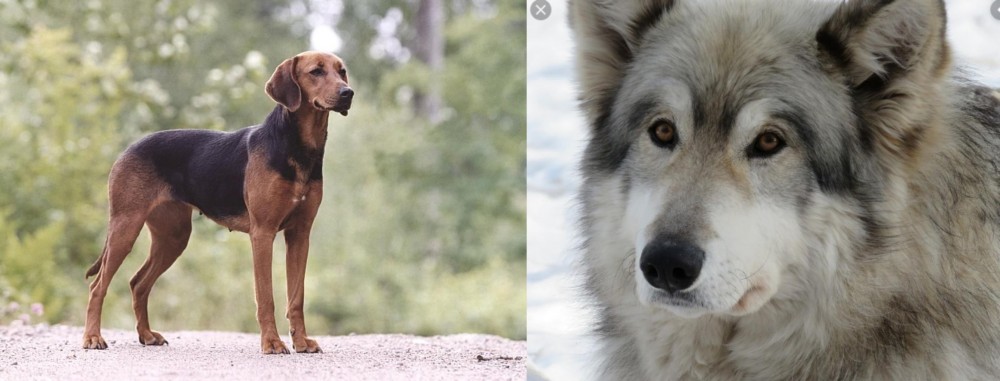 Schillerstovare is originated from Sweden but Wolfdog is originated from Germany. Schillerstovare may grow 15 cm / 5 inches shorter than Wolfdog. Schillerstovare may weigh 20 kg / 44 pounds lesser than Wolfdog. Schillerstovare may live 3 years more than Wolfdog. Schillerstovare may have less litter size than Wolfdog. Schillerstovare requires Low Maintenance. But Wolfdog requires Moderate Maintenance
Schillerstovare is originated from Sweden but Wolfdog is originated from Germany. Schillerstovare may grow 15 cm / 5 inches shorter than Wolfdog. Schillerstovare may weigh 20 kg / 44 pounds lesser than Wolfdog. Schillerstovare may live 3 years more than Wolfdog. Schillerstovare may have less litter size than Wolfdog. Schillerstovare requires Low Maintenance. But Wolfdog requires Moderate Maintenance
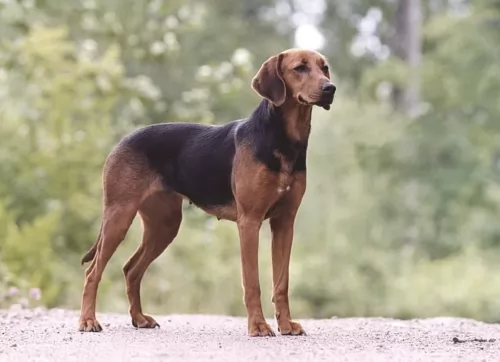 The Schillerstövare originated in Sweden, being named after a Swedish farmer, Per Schiller. After he died, the dog was named Schillerstövare in 1907, and was Sweden's first native dog breed.
The Schillerstövare originated in Sweden, being named after a Swedish farmer, Per Schiller. After he died, the dog was named Schillerstövare in 1907, and was Sweden's first native dog breed.
The Swedish Kennel Club recognised this dog in 1907 and it is also recognised by the Federation Cynologique Internationale as well as a number of minor kennels and dog clubs.
The dog has always been used as a hunting dog and the English Foxhound is the e foundation for this breed.
 The Wolfdog was brought about when domestic dogs were mated with a variety of wolves so as to produce a hybrid.
The Wolfdog was brought about when domestic dogs were mated with a variety of wolves so as to produce a hybrid.
People who want to own these hybrids have to be careful because they find that the unpredictable behavior of their pets makes it difficult for them to care for them.
Then they want to get rid of it. Every year, heaps of these hybrids are abandoned due to humans interfering with nature.
The wolfdog has been bred with a number of dogs but we think about it more in terms of wolf and German shepherd.
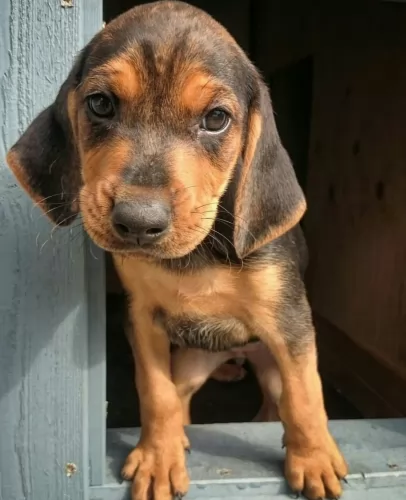 The Schillerstövare is a medium to large sized dog. They’re athletic and muscular.
The Schillerstövare is a medium to large sized dog. They’re athletic and muscular.
Standing at between 53–61cm in height and weighing in the region of 18–25kg, the coat of the dog is fairly short and harsh, with the color being black and tan.Sometimes you’ll see some white markings on the chest and paws.
The head is domed, the eyes brown, bright and alert and the ears of the dog are broad, medium length and floppy. The long tail is carried low or held out when running or alert.
If you allow your Schillerstovare to have puppies, you can expect between 3 to 7.
The Schillerstovare is a calm dog but he can get petty lively when there’s a game to be had. He gets on well with well disciplined children who have been taught to be kind and respectful to animals. He also gets on well with pets in the home. Just like with most other dogs, he will need to be trained and socialized as he is a strong willed, confident, dominant dog.
He is friendly and active but will be somewhat reserved around strangers.These dogs will require a lot of exercise and will need quite a bit of space too. They aren't well suited to small properties in the city. He will need a daily walk but also a chance to get off his leash and run free in the park. Other forms of exercise such as hikes, ball game and swimming will delight him.
 People mesmerized by the wolf long to bring some of that wildness home, and the wolfdog is supposed to do this.
People mesmerized by the wolf long to bring some of that wildness home, and the wolfdog is supposed to do this.
Their looks differ a lot, even those that come from the same litter. You can’t have a predictable looking wolf dog because it could be any domestic dog bred with a wolf so they display a large variety of appearances.
Most Wolfdogs seem to have smaller heads than pure wolves. The ears seem to be bigger and more pointy.
A popular wolfdog mix is a German Shepherd mixed with the wolf. These dogs can be between 70 to 76cm in height and weigh between 40 and 45kg.
Their coat is thick and can be in colors of grey, cream, red, white, dark brown and black.
While the wolfdog can be trained to become quite a friendly kind of dog, it is not suitable for the first time dog owner. It can show bouts of aggressiveness around strangers and be highly protective of its family.
However, this can be helped with early socialization and training. It is illegal to own the wolfdog in some states. You don’t want to leave a wolfdog alone with your children even though the dog is capable of love and loyalty towards his human family.
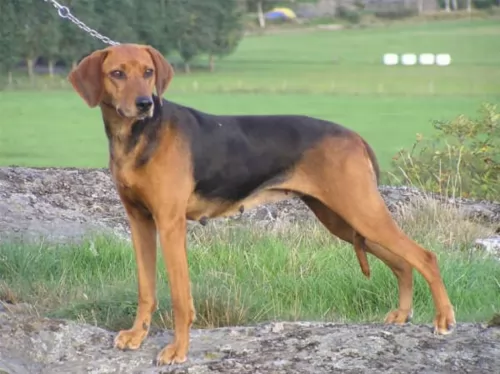 Schillerstovares are social, loving, friendly, loyal dogs who enjoy being around their human family. He’s going to need a lot of exercise, both mental and physical to keep him from boredom and frustration.
Schillerstovares are social, loving, friendly, loyal dogs who enjoy being around their human family. He’s going to need a lot of exercise, both mental and physical to keep him from boredom and frustration.
He will rely on you for at least a daily walk. He is strong-will and confident and will do well in a family where they are active and where they are firm, patient, kind and consistent in their behaviour towards him because then he ticks all th right boxes for being a splendid pet.
 When you add the genes of a wild animal to the pool, you get a crossbreed and when its an animal from the wild, its nature is unpredictable.
When you add the genes of a wild animal to the pool, you get a crossbreed and when its an animal from the wild, its nature is unpredictable.
Many people don’t think about the consequences of what they do when they interfere with nature and the wolfdog gets put down when it behaves like a wild animal and attacks or bites out of defense.
Yes, they can be loyal, loving pets but always you will have the shadow of the dog or wolf’s unpredictable behavior.
There is a reason why these dogs are banned in a number of states. This dog-type-wolf breed is not recommended as a pet at all – take a look at animal shelters and the number of wolf dogs there and ask yourself why.
 Even though your Schillerstovare is a healthy dog breed, hip dysplasia is a common dog disease that many dogs get.
Even though your Schillerstovare is a healthy dog breed, hip dysplasia is a common dog disease that many dogs get.
This is a skeletal disease when a dog’s hip joints become partially dislocated. It can be very difficult for your dog to get around, and he can also develop arthritis. It gets very sad when your dog doesn’t even want to participate in games anymore.
 They will also be susceptible to common dog ailments such as parasites and hip dysplasia.
They will also be susceptible to common dog ailments such as parasites and hip dysplasia.
Like any other dog, these Wolf dogs will also possibly develop tumors. He will also need to be vaccinated against harmful diseases and you will need to have a reliable local vet who is interested in your wolf dog.
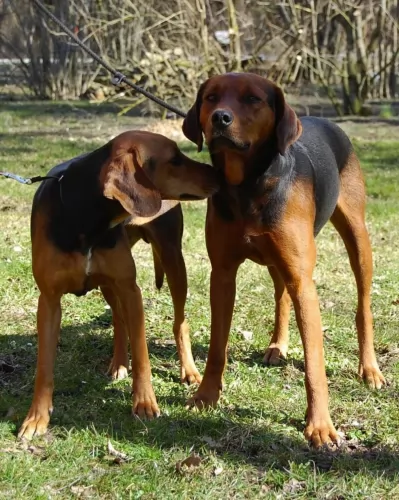 With his short coat, the Schillerstovare is considered a low maintenance dog and requires a minimal amount of grooming. Brushing should be done twice a week to remove loose hair. The harsh outer coat seems to repel dirt and dust.
With his short coat, the Schillerstovare is considered a low maintenance dog and requires a minimal amount of grooming. Brushing should be done twice a week to remove loose hair. The harsh outer coat seems to repel dirt and dust.
Trim your pet’s nails, check inside his ears for signs of redness, make sure his eyes are bright and clear and make sure he doesn’t have any unusual lumps on him.
Make sure his vaccines are up to date to avoid deadly canine diseases. Take him to the vet when you suspect he isn’t his normal self.
Dogs, just like humans, do well on good, nutritious diets. Feed a human lots of junk food and sweets and they’ll grow up to be obese and unhealthy. That's exactly how it is with dogs too. Some of the best commercially manufactured dog foods are convenient and they can be good if you look at the top brands. Look for ones that cater for your dog’s age, size, breed and activity levels. This dry kibble can be made more inviting for your pet when you include some homemade food.
Dogs just want simplicity so that they don’t battle with digestive problems. Boiled chicken, sweet potatoes, brown rice or pasta, carrots and spinach will be wonderful for him when you chop the food up and add it into the dry kibble twice a week. See his tail wag and his brown eyes light up when he smells this treat. Some raw meat added up occasionally will also contribute to your pet’s heath.
Make sure he is never without a constant supply of fresh, cool water.
 If you own a wolfdog the same care procedures would need to be followed as you would with a regular dog.
If you own a wolfdog the same care procedures would need to be followed as you would with a regular dog.
A wolfdog, however, can’t be vaccinated against rabies. It seems that the reason for this is that it is due to current legislation, and vaccine manufacturers don’t want to support wolf dogs as pets because they are considered to be dangerous.
Provide your wolfdog with highly nutritional, protein-based food. You don’t want to feed your wolfdog any of the low quality, traditional store-bought food high in carbs and artificial additives. Instead, look for a diet rich in proteins and be sure to give this dog some raw meat occasionally.
The dog is active and you will need to provide heaps of exercise for him, both mental and physical activities.
The wolfdog will require training but it will require dedication, though it can be done as the dog is very intelligent.
Even with training, the wolfdog isn’t suited to life in the city but should be kept in the countryside.